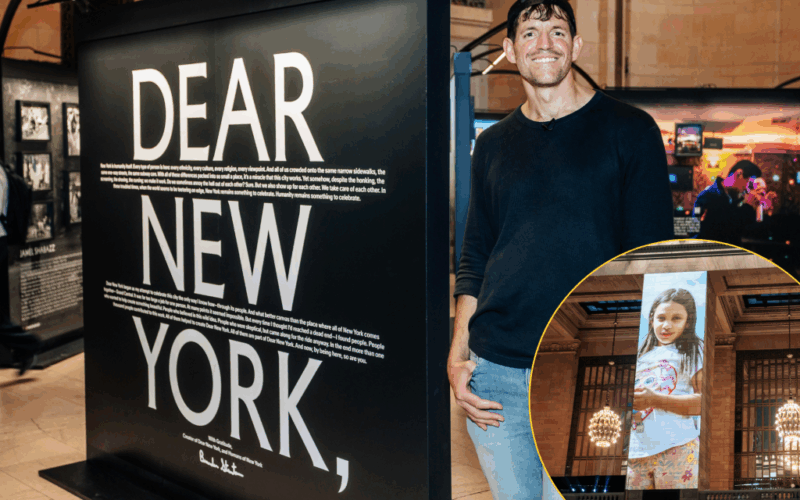For the first time in Grand Central Station’s history, there are no ads, just art.
Photographer Brandon Stanton has turned the transit hub into “Dear New York,” an ambitious, two-week art installation. He’s replaced all of the 112-year-old terminal’s commercial signage with portraits of fellow New Yorkers and their personal stories, and projected 50-foot-high images of his subjects onto the station’s marble walls.
“It’s the largest use of physical space for a single installation in the history of the New York subway system,” Stanton told The Post of the project, which runs through Oct. 19. “This was an attempt to recreate the city and its people in a single building. This is what I’m trying to celebrate.”
The 41-year-old is also the man behind the phenomenally popular Humans of New York (@humansofny) Instagram account, which the exhibition draws from.
In 2010, he lost his job as a bond trader in Chicago and moved to NYC to begin an inherently simple documentary project: He would take photos of locals, interview them, then share their pictures and stories with the world.
“When I first came to New York City, my impression was that the entire world was here — all of these beliefs and ethnicities and cultures and viewpoints, crammed together on the same sidewalks, the same subways,” he said.
Fifteen years later, he’s captured more than 10,000 people across the five boroughs — everyone from go-go dancers and hedge funders to crossing guards and homeless fathers. Along the way, he’s racked up more than 12 million Instagram followers and published four best-selling books.
The most recent, also named “Dear New York,” was released earlier this month and serves as a record of sorts for the massive exhibition, which includes over 150 digital screens around the station.
In a children’s gallery, located in one of the terminal’s wings, Stanton originally planned to feature portraits taken by 300 NYC school kids. But, when more than 600 submissions came in, he refused to cut anyone — instead adding digital frames so everyone could be included.
Multiple kids came up to take photos of their photos during The Post’s interview, and Stanton couldn’t hide his joy.
“I’ve been waiting for this moment so long,” said the artist, who funded the installation using his book advance and personal savings. “I was just a crazy guy with this crazy dream to transform the entire building into a piece of art.”
For Stanton, who has toiled away in solitude for years, the undertaking marks the first time he’s worked so collaboratively.
Over 100 people were involved in bringing the project to life. Chief among them were co-creative directors David Korins, a Broadway designer who has worked on “Hamilton” and “Dear Evan Hansen,” and Andrea A. Trabucco-Campos, a partner at Pentagram Design, the world’s largest design consultancy.
For Stanton and his team, it was important that the portraits not bare his moniker.
“The MTA has a rule that you have to write your brand name [on any display] to identify who paid for it,” Stanton said. “That was a huge sticking point because [I believed it should] only be the people and their stories. When you walk through here, it can’t feel like you’re being sold to.”
That sentiment reflects the larger thesis behind Humans of New York: Stanton has never taken a sponsored post, never altered his approach to fit the algorithm, never chased virality at the expense of authenticity.
“I moved to New York to be an artist — not to have a lot of followers, not to have a lot of money,” he said. “It’s been 15 years but I’m doing the same thing I’ve always done. Stories are powerful.”








